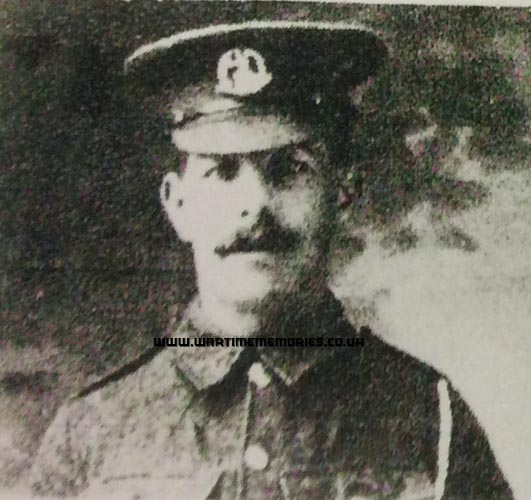Additions will be checked before being published on the website and where possible will be forwarded to the person who submitted the original entries. Your contact details will not be forwarded, but they can send a reply via this messaging system.
please scroll down to send a message
L/Cpl. Elvin Spencer Bulley
British Army 9th Btn. Norfolk Regiment
from:Acle, Norfolk
(d.17th September 1916)
Elvin Bulley, 9th (Service) Battalion, Norfolk Regiment who died on Sunday 17th of September 1916, age 32 years was the son of William and Rosanna Bulley of Swafield, North Walsham.
Elvin Bulley went to France in October 1915 and is first mentioned in Army records when he was admitted to the General Hospital at Etaples with influenza on 22nd of December 1915.
From the Battalion War Diaries we know that on 11th of September 1916 the 9th Norfolks moved to trenches south of Trones Wood at about 10pm. There they mainly slept in shell holes as there were no dugouts. On the 13th there was a good deal of shelling. On 15th September the battalion arrived in the trenches at 1am and took up the line on the Ginchy to Leuze Wood road from where an attack was launched at 7.20am. The Germans occupied the high ground just to the east of Ginchy and had constructed a formidable four-sided trench complex approximately 300 yards by 150 yards. The British called it The Quadrilateral. This was the Norfolk's objective, a position that other units had attempted to take in previous days; attempted and failed. Trenches immediately to the north were the Norfolk's objective.
In the light of dawn they moved forward to take up final positions for their attack. They were ready but the staff who had planned the attack were guilty of serious errors of judgement. The customary artillery barrage normally used to smash defences and prevent the advance of reinforcements, was zeroed on ground 500 yards beyond the Quadrilateral! The Norfolks were therefore expected to advance and engage the Quadrilateral's defences with only one tank to support their valiant efforts.
Some historians believe that yet another human error would play a hand in the battle. One tank assigned to support the attack was believed to have inflicted heavy casualties with its machine guns on the Norfolks as it started to move forward before zero hour! If this "friendly fire" incident did take place it is perhaps strange that no reference is made to it in the War Diary written at the time.
At 0620 hours the British artillery barrage began and the ground on either side and beyond the Quadrilateral (where there were no Germans) erupted in smoke, flames and violently disturbed earth. Hardly a shell fell on the Quadrilateral from which there was devastating machine gun fire against the advancing Norfolks. They had to contend with uncut wire as well so, after moving only a short distance, were pinned down in no-man's land trying to find shelter in the numerous shell holes. By 0900 hours it was evident that the attack had failed. The tank that had been involved returned to the British positions leaving the infantry with no covering fire. Tragically, later in the day, those Norfolks still alive, lying out in no-man's land, were subjected to British artillery fire.
As darkness fell the Quadrilateral remained intact and the 9th Battalion had paid a heavy price for their gallant efforts with 17 officers and 431 other ranks becoming casualties. Elvin Bulley was one of them and is buried at the nearby Guillemont Road Cemetery (Somme).
The Norfolk News on the 14th of October 1916 reported, News has reached Acle of the death of Elvin Bulley of the Norfolks who was killed in action during last week. The deceased was a resident in Acle for nine or ten years and was a moulder at Messrs Smithdale and Sons, Acle. He was quite a favourite among the young fellows. He was captain of the Acle football team for several years and also a member of the Queen's Head Bowling Club. Soon after the war broke out he enlisted with several others of the parish. His brother was fighting beside him in the same trench and was wounded a few hours earlier.
He was awarded the 1915 Star, British War Medal, and Victory Medal.
